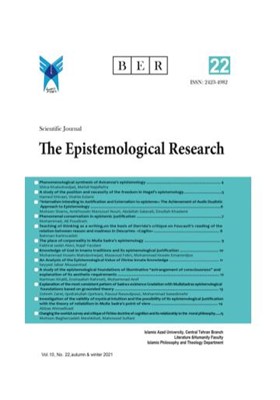A study of the epistemological foundations of illuminative “estrangement of consciousness” and explanation of its aesthetic requirements
Subject Areas : Epistemological researchesNariman Khalili 1 , ensha'Allah Ramati 2 , Mohammad Aref 3
1 - Ph.D. Candidate of art research department, central Tehran Branch, Islamic Azad university, Tehran, Iran, kalili_nariman@yahoo.com
2 - Department of Philosophy and Wisdom, Central Tehran Branch, Islamic Azad University, Tehran-Iran
3 - Department of Drama, Central Tehran Branch, Islamic Azad University, Tehran-Iran
Keywords: aesthetics, Epistemology, phenomenology, stranger consciousness, : Sohrewardi,
Abstract :
In this article the epistemological foundations of estrangement of consciousness in Sohrewardi's thought are analyzed by asking the question of what is the origin of these foundations. Illuminative knowledge is knowledge in presence and is the opposite of acquired knowledge. Sheikh Ishraq considers that the inference and opening of what science is? What its foundation is? And how it is understood? By referring to the knowledge in presence. The present study shows that the guide and common point of aesthetics of agent of species and the epistemology of "return to me" by the earthly self will be in the meta-historical process. Sohrevardi's anthropology has led to one of the most basic themes of Corbin, namely the estrangement of consciousness. In this article, based on the origin and function of "fall down", the existence focused on the other side of death has been interpreted in the movies with the theme of estrangement of consciousness. In the narratology of films with the theme of stranger consciousness it was found that in the three - dimensional unity of story (narrator, narration and the object of narration) the narrator is the subject and also the theme and object of epic. To analyze these epistemological foundations and aesthetic accessories, Henry Corbin’s phenomenological method has been used
قرآن
پورنامداریان، تقی.(1394). عقل سرخ: شرح وتأویل داستانهای رمزی سهروردی، چاپ چهارم، تهران: انتشارات سخن.
خادمی، عینالله، کوکرم، فاطمه.(1392). سیر و سلوک اشراقی بر اساس قصه غربت غربی، عرفان اسلامی، شماره 39 .
رحمتی، انشاءالله.(1392).کیمیای خرد، جستارهای در زمینه دین و اخلاق، تهران: نشر سوفیا.
رهنما، فریدون.(1381). واقعیت گرایی فیلم، تهران: انتشارات نوروز هنر.
سهروردی، شهاب الدین یحیی.(1380). مجموعه مصنفات شیخ اشراق، جلد اول، تصحیح و مقدمه: هانری کربن، چاپ سوم، تهران: پژوهشگاه علوم انسانی و مطالعات فرهنگی.
--- .(1380). مجموعه مصنفات شیخ اشراق، جلد دوم، تصحیح و مقدمه ، هانری کربن، چاپ سوم، تهران: پژوهشگاه علوم انسانی و مطالعات فرهنگی.
--- .(1380). مجموعه مصنفات شیخ اشراق، جلد سوم، تصحیح و تحشیه و مقدمه، سید حسین نصر ، چاپ سوم، تهران: پژوهشگاه علوم انسانی و مطالعات فرهنگی.
کُربن، هانری.(1395). تخیل خلاق درعرفان ابن عربی، مترجم انشاءالله رحمتی، چاپ سوم، تهران: نشر جامی.
--- .( ۱۳۹۵). سیاوخش در تخت جمشید، ترجمه فریده رهنما، بخارا، خرداد و تیر، شماره ۱۱۲
--- .(1393). چشم اندازهای معنوی و فلسفی اسلام ایرانی، جلد اول. مترجم انشاءالله رحمتی، چاپ دوم، تهران: سوفیا.
--- .(1394). چشم اندازهای معنوی و فلسفی اسلام ایرانی، جلد دوم. مترجم انشاءالله رحمتی ، چاپ دوم، تهران: سوفیا.
--- .(1394). زمان ادواری در مزدیسنا. مترجم انشاءالله رحمتی، تهران: نشر سوفیا.
--- .(1394). معبد ومکاشفه، مترجم انشاءالله رحمتی، چاپ سوم، تهران: سوفیا.
--- .(1392). ابن سینا و تمثیل عرفانی، مترجم انشاءالله رحمتی، چاپ سوم، تهران: سوفیا.
کمالی زاده، طاهره.(1390). بررسی مراتب شهود در معرفت شناسی اشراقی، فلسفه وکلام اسلامی، شماره یکم، سال چهل وچهارم.
_||_

